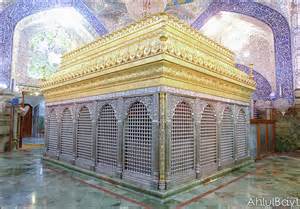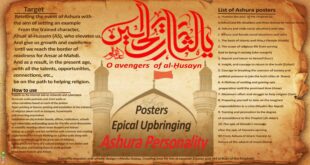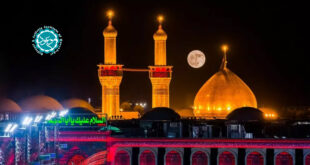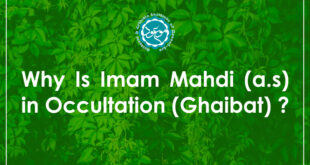Did Sayyid al-Shuhadā’1 (‘a) know that he would be martyred on his journey from Mecca to Kūfah? In other words, did he depart for Iraq with the intention to be martyred or to form a just and totally Islamic government?
Sayyid al-Shuhadā’ (‘a)—in the belief of the Shī‘ah—is a sacrosanct Imām, the Prophet’s (S) third successor, and bearer of complete trusteeship. According to narrated confirmation and intellectual rationales, the knowledge of Imāms regarding external events is of two types.
First type of their knowledge
By God’s will, the Imāms are aware of the truths of the world of existence in all conditions including that which can be perceived by the senses and that which is beyond them such as heavenly beings and past and future events.
Rationale: there are widely transmitted [mutawātir] narrations that are cited in Shī‘ah compendiums of hadīth including, “Al-Kāfī”, “Basā’ir”,“Bihār al-Anwār”, Sadūq’s books, etc. These innumerable hadīths indicate that Imāms (‘a) are aware of everything due to divine blessing not personal acquisition. Whatever they want to know, by the leave of God they realize with the slightest attention.
Of course, there are verses in the Holy Qur’an that determine knowledge of the unseen [‘ilm al-ghayb] to be specific to God, the Exalted. However, the exception in the following verse shows that the exclusiveness of knowledge of the unseen for God signifies that no one possesses such knowledge independently in and of itself, save God.
“He is knower of the Invisible and He reveals His knowledge of the unseen unto no one, save those messengers He has preferred…”2
Therefore, it is possible for preferred messengers to know about the unseen through divine instruction and for other elect to know through the prophets’ instruction, as many narrations state regarding the Prophet and all the Imāms that they passed their knowledge to the next before their deaths.
There are also intellectual rationales expressing that the Imāms (‘a), who because of their brilliant status, are the most complete humans of their times, perfect manifestations of divine Names and Attributes, and know everything in the world and every personal incident.
Due to their fundamental nature, whatever the regard, its knowledge is made clear to them. In view of the fact that these rationales are dependent upon a series of complex intellectual matters that are beyond the scope of this article, I will leave them to be examined in their own special place.
Practical effects of Imamate knowledge and its relationship with obligation
A point that must be especially regarded is that such benedictory knowledge, as per the logical and cited reasons proving its existence, is completely inviolable, inalterable, and irreproachable. In other words, it is knowledge of that which is recorded in the Lawh-i Mahfūz3 and awareness of the certain providence [qadā’] of God.
This necessitates that the possessor of such knowledge per se has no duty regarding it because it is inevitable. Also, the person may hold no intention or desire in regard to acting on such knowledge since duty rises from the possibility of action and, where volition is concerned, action and avoidance of action are both facets of responsibility—either action or inaction may be intended.
However, in view of the fact that such knowledge is ineluctable and predetermined, there is no way that responsibility can apply to it.
For instance, it would be correct for God to tell His servant to perform a certain task that is possible to either do or not do. However, it is impossible for Him to command a person to or proscribe them from doing something that will certainly happen due to God’s genetic providence since such a demand would be null and void.
Also, a person can intend to do something that is possible, set it as their purpose, and endeavor to achieve it. However, never can a person intend to do something that will assuredly and providentially happen and endeavor to carry it out since the willingness or unwillingness of a person has no effect on that which will assuredly happen because it will assuredly happen (regard carefully).
This shows that:
1. This benedictory knowledge of the Imāms (‘a) has no effect on their actions and no relationship with their specific duties. Essentially, any sure event, because it is linked to certain providence and is inevitable, cannot pertain to commandments or injunctions, or human intention. Indeed, what the certain fate and providence of Truth, the Almighty, does necessitate is contentment with fate. Thus, Sayyid al-Shuhadā’ (‘a) said amid blood and dust at the final hour of his life:
“With contentment for Your providence and in surrender to Your command. There is no object of worship besides You.”
Furthermore, in an oration before he left Mecca he said:
“The satisfaction of Allah is in our satisfaction; that of the Ahl al-Bayt.”4
2. In regard to divine providence, the certainness of a person’s action does not negate the fact that it is voluntary because divine providence regarding an act pertains to all its possible circumstances not the act in and of itself. For example, if God wants a person to perform a specific volitional action by his own free will, the external realization of this volitional act will be certain and unavoidable because the will of God has applied to it. Simultaneously, for the human in question it is voluntary and possesses the quality of possibility—as opposed to inevitability (regard carefully).
3. The appearance of the Imāms’ (‘a) actions should not be considered a reason for their ignorance of the unseen and to debunk the existence of this benedictory knowledge. This is like asking: if Sayyid al-Shuhadā’ (‘a) knew what was going to happen, why did he send Muslim to Kūfah as his representative? Why did he write a letter to the people of Kūfah through Saydāwī? Why did he get himself killed when God states:
“And cast not yourselves by your own hands into destruction…”5
Why, why, why? The answer to all these questions has already been made clear from the foregoing discussion and there is no need for reiteration.
Second type of Imamate knowledge: normal knowledge
According to the Qur’an, the Prophet (S) and the Imāms (‘a) of his pure lineage are humans like the rest of us and the actions they perform in the course of their lives are similar to those of other humans–volitional and in accordance to normal knowledge. Like other people, the Imāms (‘a) determine the goodness and evil, and advantages and disadvantages of things through normal knowledge intending to do what is worthy of being done and endeavoring accordingly.
If external causes, factors, and conditions are favorable, their endeavors are successful and if causes and conditions are adverse, they fail. The fact that the Imāms (‘a) know the details of all past and future events has no effect on voluntary acts—as we have stated.
 Mouood Mouood English Edition
Mouood Mouood English Edition




